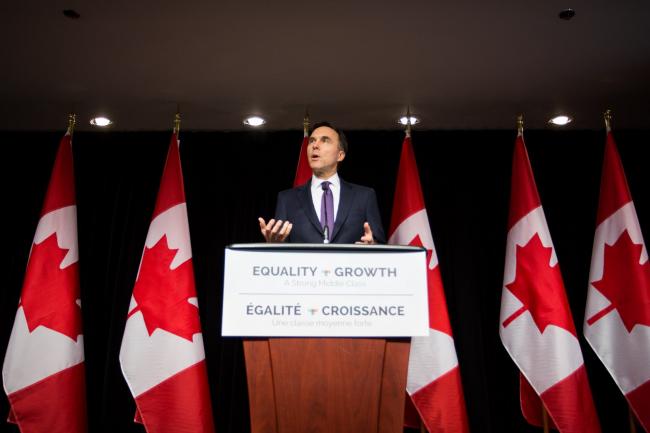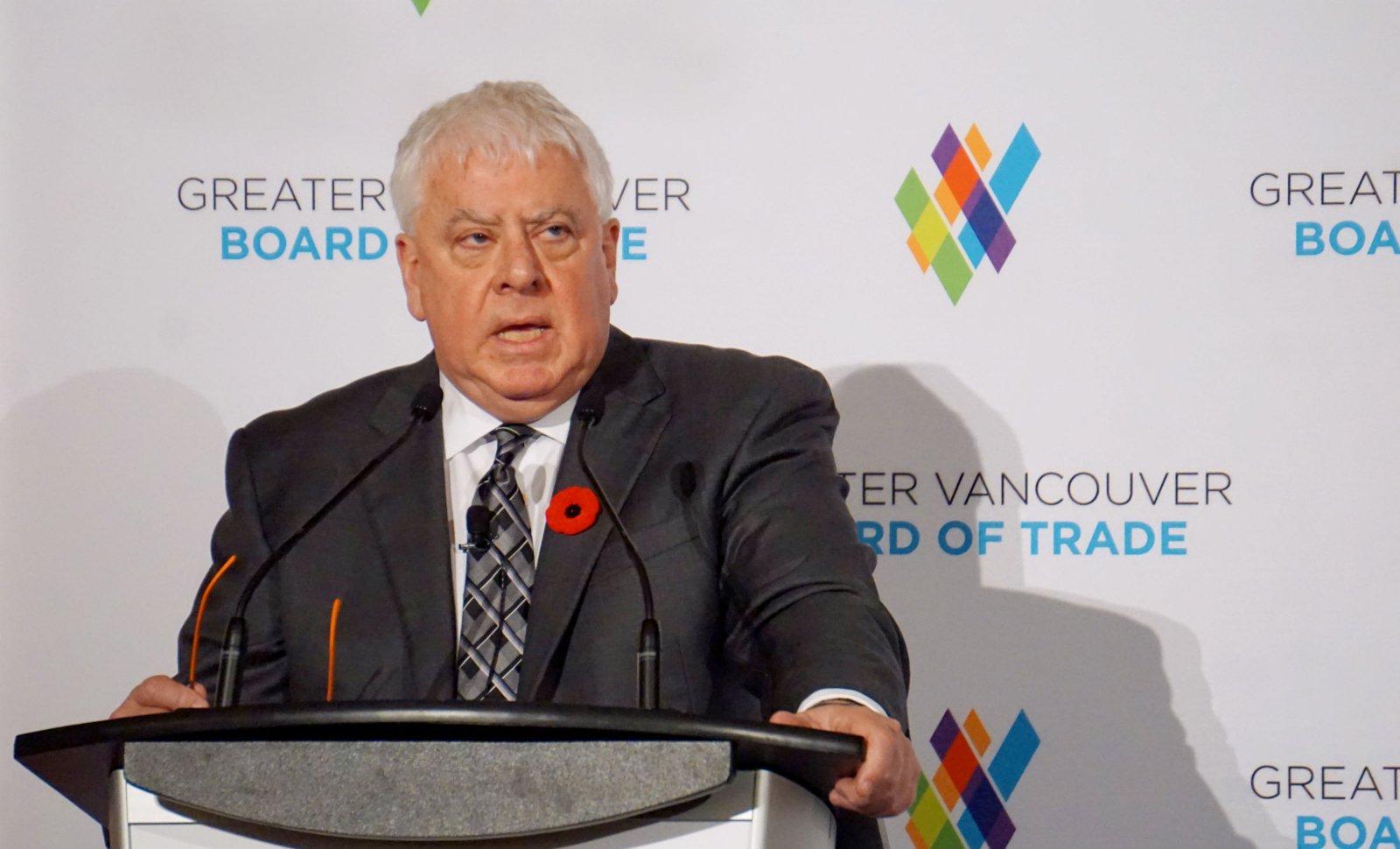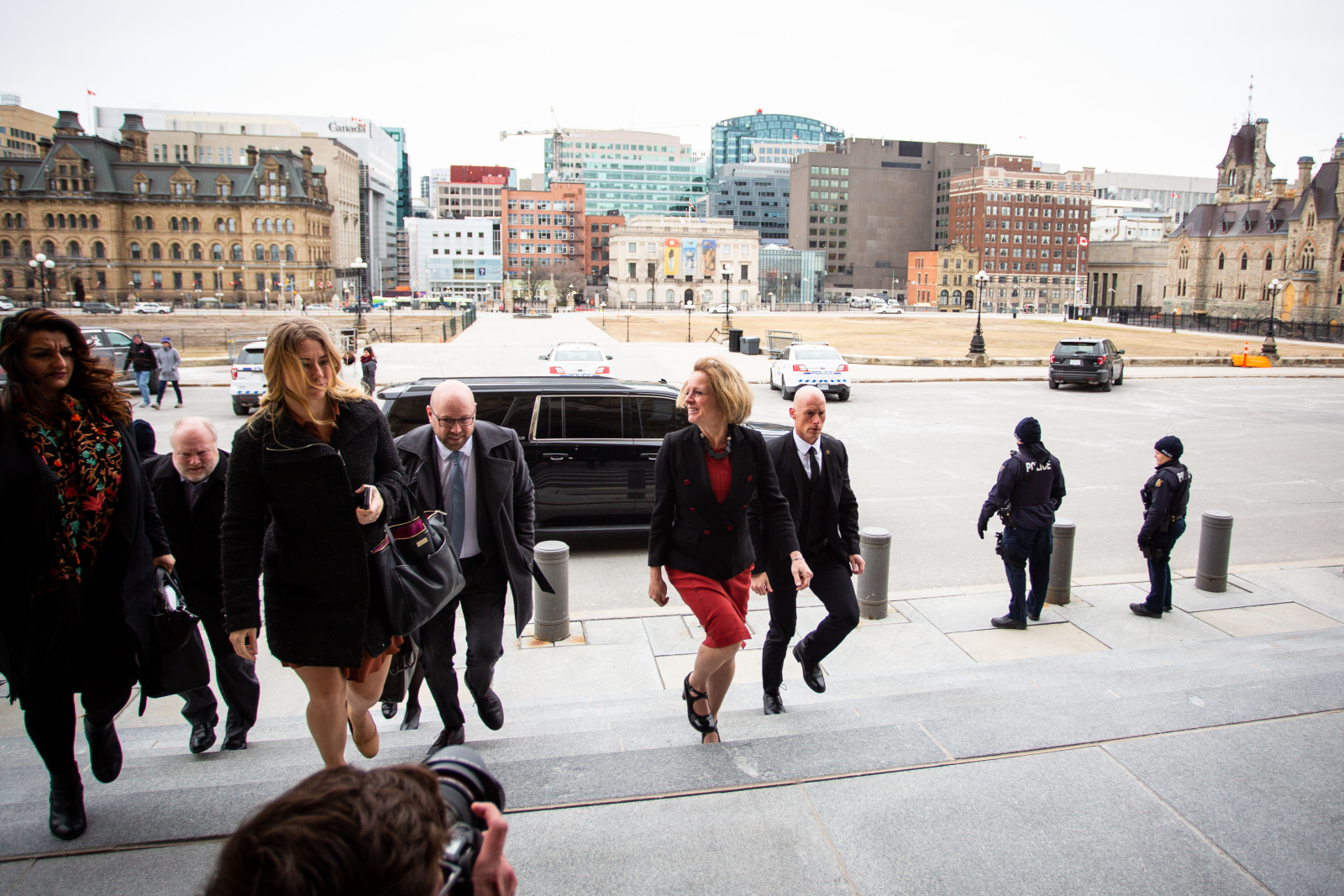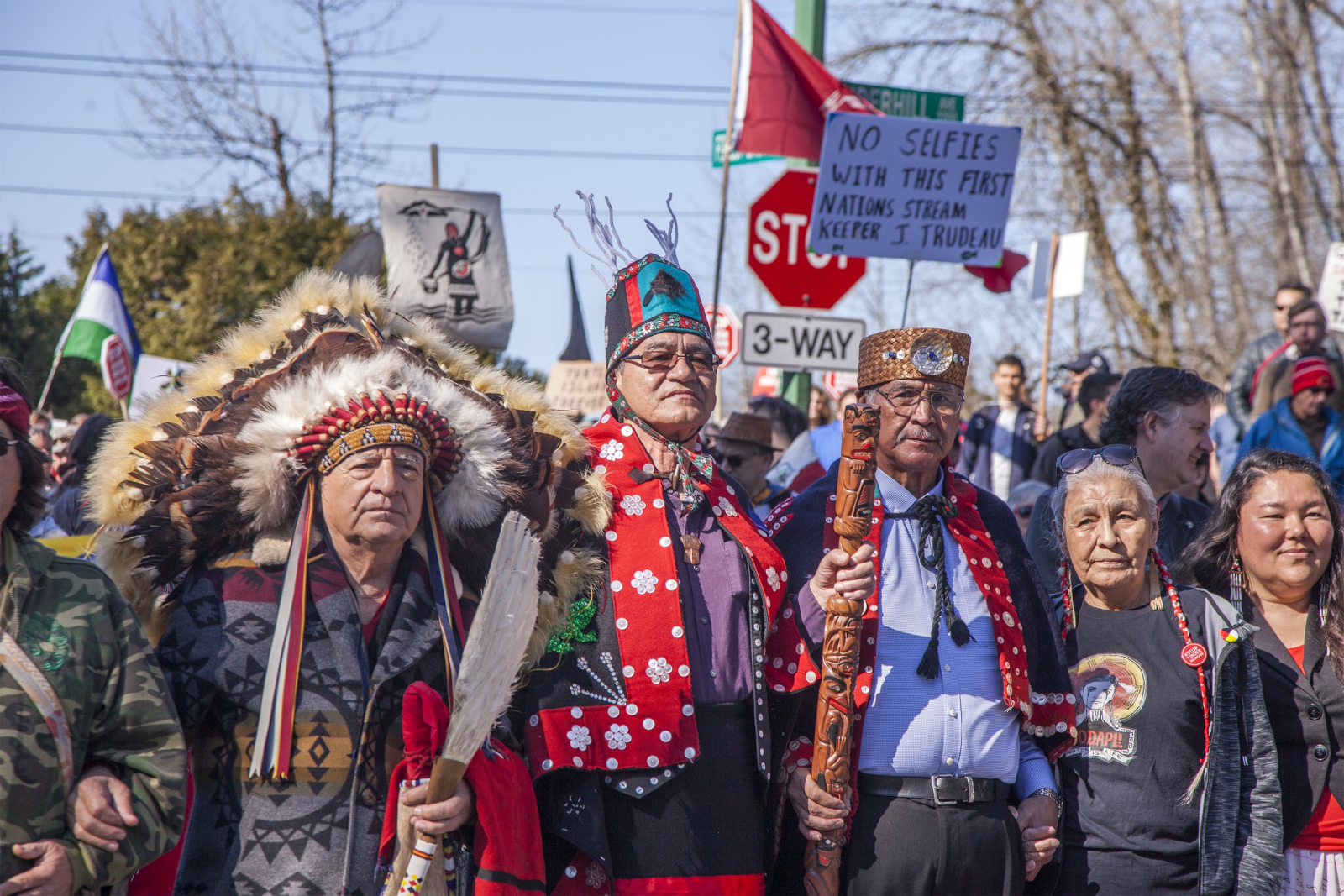Articles Menu

Finance Minister Bill Morneau said Wednesday he is prepared to protect the Trans Mountain oil pipeline expansion to the west coast against financial loss.
The Trudeau Liberals have been in discussions with Alberta as well as the proponent of Trans Mountain, Kinder Morgan, over an arrangement to use public money to back the pipeline. British Columbia NDP Premier John Horgan, however, has pledged to use all legal tools available to block its construction.
"We are prepared...to indemnify the project against any financial loss that derives from Premier Horgan's attempts to delay or obstruct the project," Morneau said on May 16 at the National Press Theatre in Ottawa.
Indemnity refers to a financial instrument where one party agrees to be liable to pay money or perform an obligation against an anticipated loss.
"This indemnification would allow Kinder Morgan to finish what they started, what they received federal and B.C. provincial approval to do," said Morneau.
Morneau also said if Kinder Morgan decides not to proceed with Trans Mountain, "the indemnification would still be in place for another party who might wish to take over the project."
“We think plenty of investors would be interested in taking on this project, especially knowing that the federal government...is willing to provide indemnity to make sure it gets built,” said Morneau.
He didn’t elaborate on what other parties might be interested. There is already a Trans Mountain pipeline in use since 1953; the expansion project would triple the capacity of oil and other petroleum products shipped from producers in Alberta's oilsands, up to 890,000 barrels per day, to a terminal in the metro Vancouver suburb of Burnaby, B.C.
Reaction across the country was swift and sharp. Grand Chief Stewart Phillip, president of the Union of B.C. Indian Chiefs, said “Canada cannot indemnify against the risks of not respecting Indigenous Title and Rights."
Meanwhile, Alberta NDP Premier Rachel Notley called Morneau's statements an "important step" as she brandished a new law to restrict energy shipments to B.C., saying she was "ready and prepared to turn off the taps."

Talks aren't over yet with the Texas-based energy company, and Morneau said the government was “striving to get an agreement by the May 31 deadline," referring to the date after which the company has warned it will likely pull out of the project. He repeatedly declined to discuss the substance of negotiations.
Following the announcement, Kinder Morgan Canada, which is holding its annual general meeting today in Calgary, issued a statement saying "while discussions are ongoing, we are not yet in alignment and will not negotiate in public."
"We acknowledge the comments by Minister Morneau this morning and appreciate his acknowledgement of the uncertainty created by the B.C. government's stated intentions," said chairman and chief executive officer Steve Kean.
"We remain steadfast in our previously stated principles: clarity on the path forward, particularly with respect to the ability to construct through British Columbia, and ensuring adequate protection of our (Kinder Morgan) shareholders."
We appreciate @Bill_Morneau's acknowledgment of the uncertainty created by the #BC Government ‘doing whatever it takes to stop the federally and provincially-approved Project. http://ow.ly/VKT930k2acW #TransMountain #KinderMorgan #pipelines #Cdnpoli #BuildKM
“Today’s announcement was a pledge to write a blank cheque, backed by public money, to a Texas oil company in a desperate play to bailout a pipeline that violates (Prime Minister) Justin Trudeau’s own promises on climate change and Indigenous rights,” said Aurore Fauret, a campaign coordinator with 350.org.
Tzeporah Berman, campaigns and communications director for Stand.earth, called it “a desperate attempt by the Trudeau government to use taxpayer money to bail out a collapsing project.”

Federal NDP leader Jagmeet Singh made his opposition to the pipeline clear a few hours after Morneau's press briefing.
Singh tweeted that the "Liberals are giving Texas oil company #KinderMorgan a blank cheque while dumping all the risks on Canadians...it's clear this pipeline should not be built."
But Notley rejected Singh's comments in comments to reporters from the Alberta legislature later on Wednesday.
"I think we disagree quite fundamentally," she said. "I don’t think that the positions of Mr. Singh necessarily reflect the vast majority of opinions in the NDP across the country."
She said the provincial government was focused on its "responsibility to current and future generations to make real progress on stopping climate change" but that it would fail in this effort if it tossed "working people to the side as collateral damage."
Notley also said her government was poised to pass Bill 12, which will give Alberta the ability to restrict energy shipments.
Liberals are giving Texas oil company #KinderMorgan a blank cheque while dumping all the risks on Canadians
Rigged process, First Nations & local communities shut out, oil spill threats, science ignored & now billions on the line
It's clear this pipeline should not be built.
The premier said Morneau's comments revealed that Ottawa would "fully backstop the project." She also acknowledged that Kinder Morgan and Ottawa don't yet see eye-to-eye.
“I think there is still work to do...if there wasn't, we'd be announcing a deal today," said Notley.

The minister's comments reinforce how similar he, and the executives at the Texas-based energy company, see the role of the federal government in this situation.
Kinder Morgan made it clear last month that it sees the federal government’s role as breaking the impasse created by Horgan.
On a conference call in April, a day after the company issued its end-of-May ultimatum, Kean had called for “some kind of preemptive action” from Ottawa that stops B.C. from wielding its jurisdictional authority.
“We’re a private firm, we do the things that we should do for the investors that we serve, ”said Kean. “These are government entities, obviously, the federal government and the provinces — we don’t have control over that, or control over timing...we don’t have the power to convene governments.”
Morneau gave a similar explanation of the situation on Wednesday in Ottawa, saying he had found a way to “deal with the political risk.”
“The extraordinary situation we find ourselves in here is that a project that was federally and provincially approved is being thwarted — on purpose — by Premier Horgan, trying to create delays and uncertainty,” he said.
“That specific risk is a risk that, for a private sector player, is impossible to deal with. They can’t negotiate between governments. We see that as something that we can actually indemnify,” Morneau continued.
“Other business risks are other business risks. Anybody going into the business of building pipelines recognizes other risks to them.”

Morneau repeated over and over that he believes that the project is “commercially viable.” He also said it was in the “collective best interest” of Canadians, both environmentally and economically. The project is expected to create 15,000 jobs, Morneau said, including 9,000 in B.C.
“We see ourselves in a situation where we’ve got a project that has been federally approved after a rigorous environmental assessment. We’ve moved forward as part of that assessment with a world’s-best, $1.5 billion Oceans Protection Plan,” he said.
The government’s approval of the project, however, has been under scrutiny ever since National Observer reported that high-ranking public servants in the federal government discussed speeding up the review of the expansion project, and federal government sources allege that the process was rigged following Kinder Morgan lobbying.
The Alberta oilsands, deposits of a tar-like heavy oil mixed with clay beneath the boreal forest in Alberta and Saskatchewan, represent the third largest reserve of crude oil in the world. But oilsandsextraction is costly and energy-intensive, and oil producers in the region have struggled to compete in international markets.
The federal and Alberta governments have said that a pipeline to the coast would help get Canada’s oil products to market in an environmentally responsible way, and be part of a transition plan needed to allow Canada to meet its climate change goals.
But opponents say Canada will never be able to meet its climate goals unless it stops expansion of the oilsands industry.

The Treaty Alliance Against Tar Sands Expansion, for example, which was joined on May 2 by Ontario First Nations chiefs against the Trans Mountain pipeline expansion, says the risk of an oil spill in waters or lands is too great, and oilsands expansion is an obstacle to solving the climate crisis.
Protests by Indigenous leaders and environmental activists in metro Vancouver is also what drove the company to suspend construction activities last month. Hundreds of people have been arrestedat the site of a Kinder Morgan terminal.
First Nations are engaged in an ongoing legal challenge at the Federal Court of Appeal over whether the Crown adequately consulted First Nations before announcing its approval of the pipeline expansion in 2016.
Documents uncovered by National Observer have led to a motion filed by lawyers for the Tsleil-Waututh Nation in that case, arguing that the government has been sitting on evidence.
“Morneau is attempting to lay the blame for the potential failure of this project at the feet of B.C. Premier John Horgan, while avoiding addressing the real risk of First Nations legal challenges and ongoing protests," said Stand.earth strategy director Karen Mahon.
Asked how the government could indemnify the pipeline when there was still legal uncertainty, Morneau noted how the government was “engaged with people in the Indigenous community and other Canadians to make sure that we’ve heard their points of view.”
“There were 157 conditions for this project that are being satisfied. Of course we recognize people’s democratic right to put forward their points of view,” he said.
“But this project has been federally and provincially approved, and we are going to deal with the risk presented by Premier Horgan, the exceptional risk of going against what is we see a federal jurisdiction.”
[Top photo: Finance Minister Bill Morneau introduces Budget 2018 during a press conference in Ottawa on February 27, 2018. Photo by Alex Tétreault]